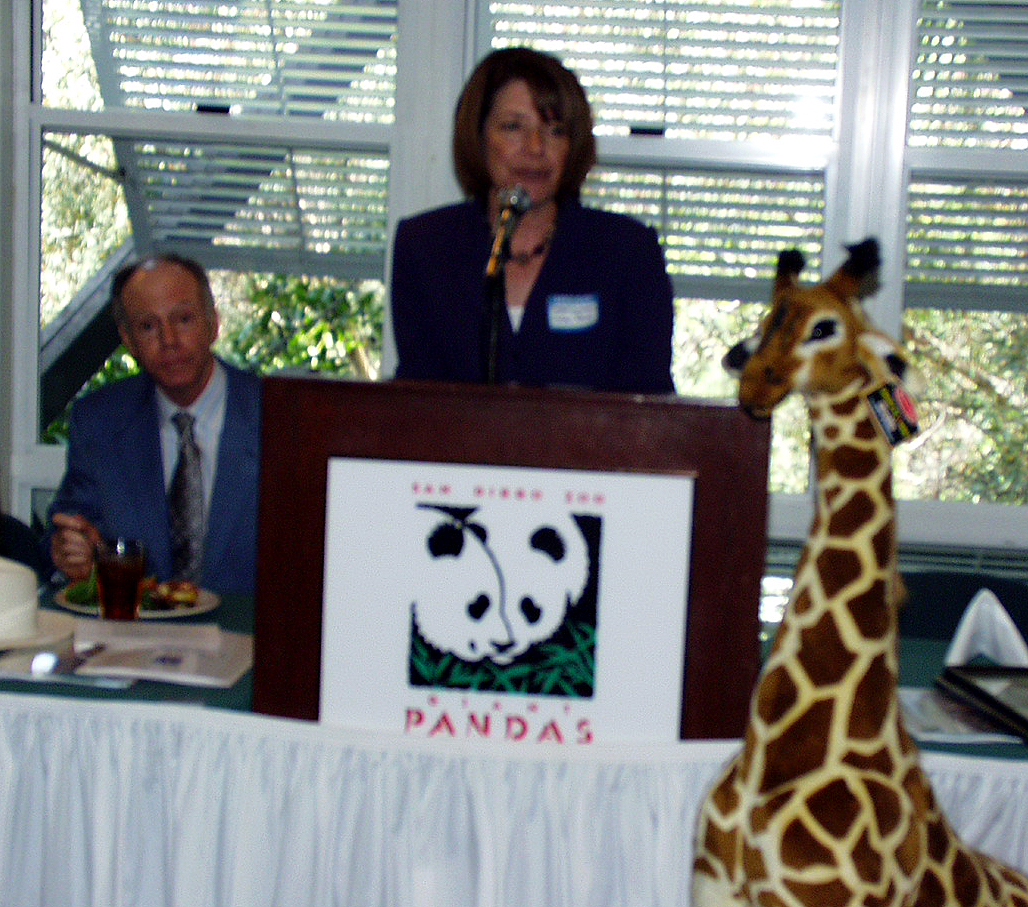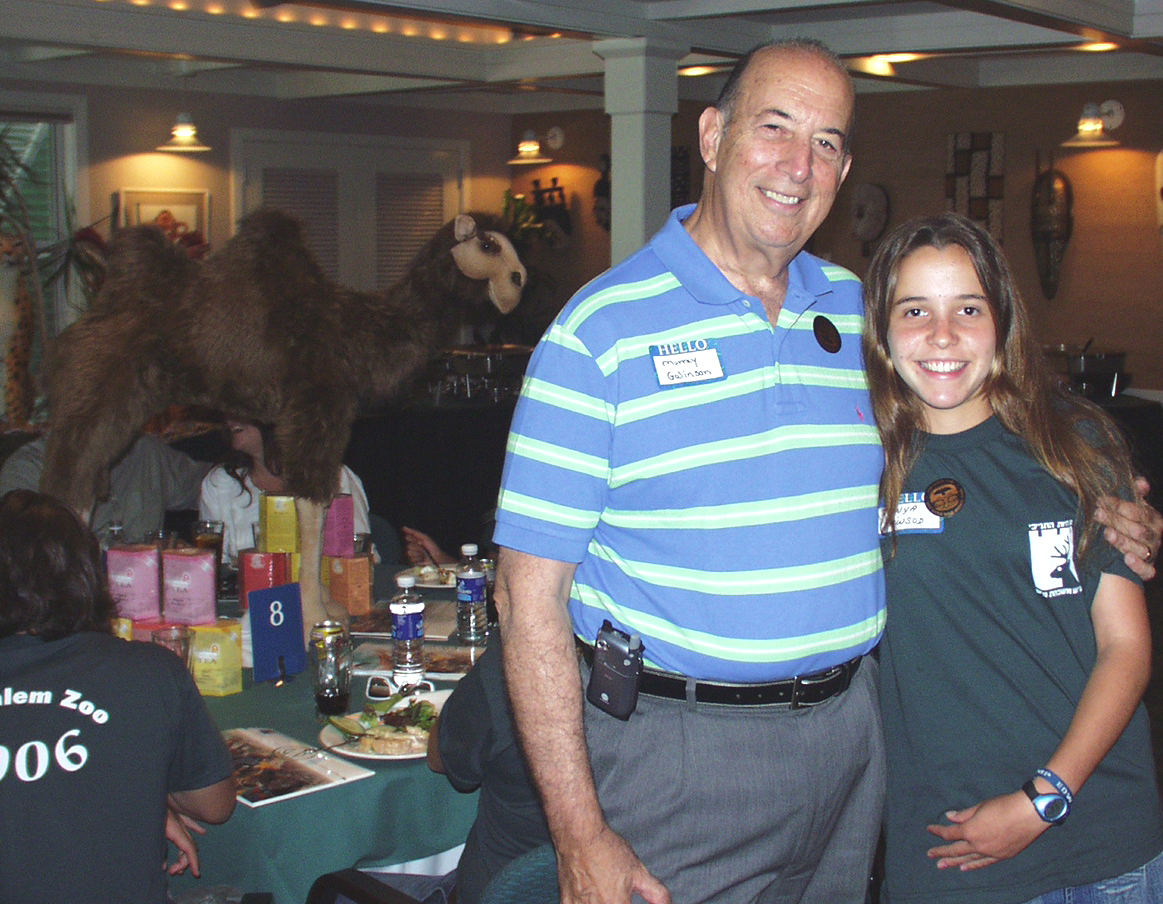By Donald H. Harrison
SAN DIEGO, Calif. — A dozen Americans and Israeli teenagers are
shuttling between San Diego's world famous zoo and its sister venue, the San
Diego Wild Animal Park, to learn not only about animals but about each other.
It is a group in which participants collectively speak at least four
languages—Hebrew, Arabic, English and Spanish—with Spanish a reflection of
the Jewish community that lives on both sides of the U.S.-Mexico border.
The July 31-August 11 program brings together six Israeli teenagers who
regularly volunteer at the Jerusalem Biblical Zoo with six American teenagers
who plan to volunteer at the same zoo during the summer.
 At
a welcoming luncheon for the six Israelis at the San Diego Zoo on Wednesday,
Aug. 2, the war clearly was on the minds of many of the speakers, including
U.S. Rep. Susan Davis (D-San Diego) and
Robert
Price, chairman of the San
Diego Friends of the Jerusalem Biblical Zoo.
At
a welcoming luncheon for the six Israelis at the San Diego Zoo on Wednesday,
Aug. 2, the war clearly was on the minds of many of the speakers, including
U.S. Rep. Susan Davis (D-San Diego) and
Robert
Price, chairman of the San
Diego Friends of the Jerusalem Biblical Zoo.
"This is an extraordinary time," the congresswoman commented to the
visiting students. "I know you don't want to necessarily dwell on
that, but to focus on the kinds of relationships that you can build... That is
probably the most important part of this effort."
Robert Price and U.S. Rep. Susan Davis (D-San Diego)
The
exchange program began in 2001, and Nick Bandak, an alumnus of the first group
of Americans, described his trip to Israel that year.. The son of a
Palestinian Christian immigrant to the United States, Bandak said it was
"amazing to be able to go there and be with the people and just pretty
much not judge but get to know them."
He added that his parents had taught him to look for the kindness in other
people, and if he followed the kindness in his own heart, things would work
out. The soundness of their advice was proven, he said, by the long-term
friendships he made while volunteering at the Jerusalem Biblical Zoo.
One of the friends from that exchange, Yossi Saad, said the program
"allows teenagers from different parts of the world to interact and
learn from each other.... I strongly believe that the more young adults
interact with each other and learn about different cultures and religions, the
more people will be open to new ideas and perspectives which will create a
much more difficult and accepting world."
Because of the continuing war between Israel and the Hezbollah forces of
Lebanon, this year's summer trip to Israel of the American teenagers has been
indefinitely delayed, according to Helena Galper, director of the San Diego
Friends group.
Price, whose family is a major underwriter of the exchange and various
capital projects at the Jerusalem Biblical Zoo, started the luncheon program
by calling for a moment of silence "memorializing those who have lost
their lives and have suffered as a result of the warfare over there in the
Middle East."
On a more upbeat note, he reported that even with Hezbollah rockets hitting
cities in northern Israel, the Jerusalem Biblical Zoo, in the center of the
country, is enjoying booming attendance. He reported that the zoo's director,
Shai Doron, told him that "they are up 15 or more percent from a year
ago—in fact the Jerusalem Zoo is now the number one site of any site in
Israel, which is beyond belief.
"I was there in March and saw the new Australian yard, which the San
Diego group had a major role in financing, and also there is a new project
from the Tisch family, which is a tiger exhibit, which will be very
nice. And there is some additional land which will be made available for
the zoo so they can expand."
 Tanya
Fainsod, speaking in behalf of the visiting Israeli students, said the
professional staff and her fellow volunteers at the Jerusalem Biblical Zoo are
doing as much as they can to help alleviate some of the stresses of warfare.
Tanya
Fainsod, speaking in behalf of the visiting Israeli students, said the
professional staff and her fellow volunteers at the Jerusalem Biblical Zoo are
doing as much as they can to help alleviate some of the stresses of warfare.
"Our zoo visits shelters in the north, bringing animals and activities to
try and cheer up children and adults who have to stay there to protect
themselves from some of the missiles," said Fainsod, 16. "Also
the zoo opened its gates to visitors from the north with symbolic prices or no
prices at all. We try to help as
Murray
Galinson, chairman of the California State
Universities and Colleges Board of Trustees, welcomes
Tanya Fainsod to luncheon at the San Diego Zoo.
much as we can with the Haifa and Kiryat Motzkin zoos with food supplies,
professional assistance and moral support.
"We see the zoo as an island of peace where people from all populations
work together in friendship and visitors from different parts of Israel are
welcome. We wish one day Israel would be like our zoo, and live
peacefully with no war within the country and within its borders.
"As for the American part of the group, we will welcome you soon in
Israel and look forward to seeing you in our country, our zoo and our
homes." Besides Fainsod, the Israeli participants are Non Hevroni,
Gadi Bris, Yohanan Nelson-Levi, Neta Tauber and Mohamad Alliyan. The American
contingent includes Carlos Krinsky, Tammy Sacks, Sara Halelooya, Mario Adatto,
Alberto Galante, and Jay Levine. A seventh American, Beth Jacobs, is
scheduled to join the group towards the end of the Israelis' visit, according
to Galper.
Fainsod's father, Abraham, a professor of biology at Hebrew University,
conducts such studies as the effects of alcohol on pregnancies. Like
Tanya and her two brothers, Jonathan and Benjamin, the professor enjoys
volunteering at the zoo. Previously he had worked with lemurs but now he
works in the new Australia exhibit, she said.
Jonathan now is in the Israel Defense Forces, while Benjamin works with the
carnivores. Fainsod said Benjamin has befriended a cheetah that came to
the zoo a few years ago. "They got to know each other when he (the
cheetah) was small" and play together.
Her own assignment is feeding and caring for the animals in the petting zoo,
where children can meet not only sheep and goats, but also such animals
as turtles, snakes, rabbits, guinea pigs, ferrets, chinchillas and a
parrot. She typically volunteers on Fridays.
One sees different kind of peoples at the Jerusalem Biblical Zoo including
secular Jews, ultra-Orthodox Jews, and Arabs, Fainsod said..
Occasionally a scuffle might break out, she said, but overall the zoo is very
peaceful where people from these diverse groups adopt an attitude of live and
let-live.
However, she said, the people who visit the Jerusalem Zoo need to learn
some lessons in how to treat the animals they visit. San Diego visitors
are much more respectful of the animals, whereas in Israel visitors,
particularly youngsters, occasionally will throw objects at the animals.
At one point, she said, the chimpanzees started throwing rocks from their
enclosure back at the humans—warfare that was stopped by erecting a net
between the cage and the spectators.
Unfortunately, there are no such nets to put up on the Lebanese border to
protect Israel against incoming missiles.

